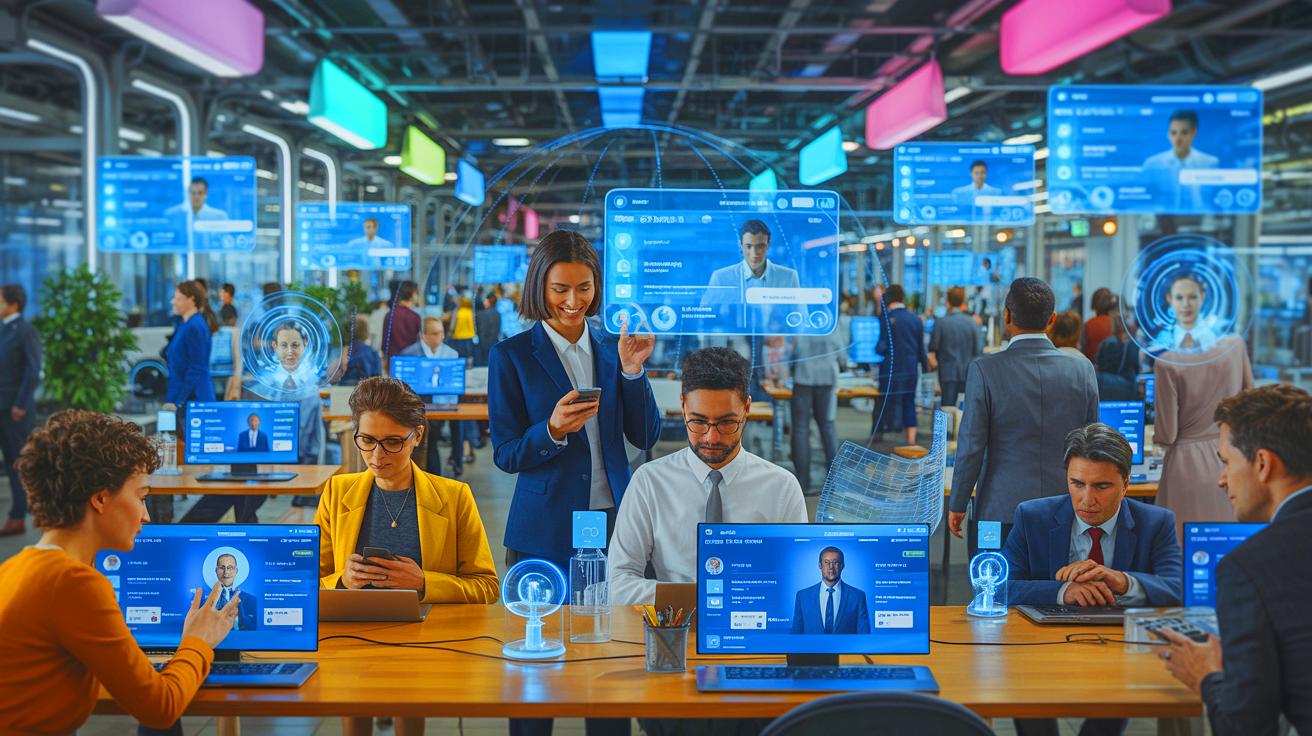IN A NUTSHELL
🚀 OpenAI plans to launch the OpenAI Jobs Platform by 2026, challenging industry leaders like LinkedIn.
🔍 The platform aims to use AI to match company needs with candidate skills efficiently.
🌐 OpenAI emphasizes inclusivity by targeting small businesses and local governments in its hiring solutions.
🤖 The rise of AI in employment raises concerns about job displacement, bias, and ethical AI use.
In the rapidly evolving landscape of technology and employment, OpenAI has set its sights on a new frontier. The company, known for its groundbreaking advancements in artificial intelligence, plans to launch a job search platform powered by AI by 2026. This ambitious project, named OpenAI Jobs Platform, aims to revolutionize the way job seekers and employers connect. As this development unfolds, it raises important questions about the role of AI giants in reshaping the labor market, particularly as industries grapple with the impact of technological advancements that continue to redefine job roles and requirements.
OpenAI’s Vision for the Future of Employment
OpenAI’s forthcoming job platform represents a bold step into a domain traditionally dominated by established players like LinkedIn. The platform is designed to leverage AI technology to match employers’ needs with the skills of job candidates. This approach promises to streamline the hiring process, making it more efficient and tailored to the specific requirements of each job listing.
The initiative is spearheaded by Fidji Simo, the newly appointed CEO of applications at OpenAI. Her leadership underscores the company’s commitment to integrating AI into everyday applications, transforming how businesses and individuals interact with technology. Simo’s experience in leading innovative projects is expected to play a crucial role in the development and success of the OpenAI Jobs Platform.
By targeting a mid-2026 launch, OpenAI is positioning itself as a major player in the employment sector. The platform aims to not only cater to large corporations but also to provide specialized pathways for small businesses and local governments. This inclusivity reflects OpenAI’s broader vision of democratizing access to advanced technology, ensuring that the benefits of AI are felt across different sectors and scales of operation.
Challenges Facing the AI-Driven Job Market
The introduction of AI into the job market is not without its challenges. As AI technologies become more pervasive, there are concerns about their impact on employment patterns. The automation of tasks traditionally performed by humans can lead to job displacement, particularly in sectors where routine and repetitive tasks are prevalent. This shift necessitates a reevaluation of workforce skills and training programs to ensure that workers are equipped to thrive in an AI-driven economy.
Moreover, the ethical considerations surrounding AI in employment cannot be ignored. The reliance on algorithms to match candidates with job opportunities raises questions about bias and fairness in hiring practices. Ensuring that AI systems are transparent and free from discriminatory practices is essential to maintaining trust in these technologies.
The OpenAI Jobs Platform will need to address these issues head-on. By developing robust frameworks for ethical AI deployment and investing in transparency and accountability, OpenAI can set a precedent for the responsible use of technology in the job market.
The Role of AI Giants in Shaping the Labor Market
The emergence of AI-driven job platforms highlights the growing influence of technology companies in shaping the labor market. As these platforms gain traction, they have the potential to redefine traditional employment models, shifting the focus from job titles to skills and competencies. This shift can lead to more dynamic and flexible career paths, aligning with the evolving needs of businesses and workers alike.
OpenAI’s entry into the employment sector exemplifies the broader trend of tech companies expanding beyond their core offerings. By leveraging their expertise in AI, these companies are well-positioned to drive innovation in various industries, including employment. However, this expansion also places a responsibility on them to consider the social implications of their technologies and to contribute positively to the communities they serve.
“The objective is to use artificial intelligence to match the needs of companies and the skills of candidates.”
https://www.rudebaguette.com/en/2025/08/felt-my-ai-lose-half-its-brain-openai-weighs-bringing-back-gpt-4o-after-gpt-5-rollout-stumbles-with-router-failure-and-chart-fiasco/
This statement encapsulates the transformative potential of AI in the job market, emphasizing the importance of aligning technological capabilities with human resources.
Preparing for the AI-Driven Job Revolution
As the anticipated launch of the OpenAI Jobs Platform approaches, stakeholders across the employment landscape must prepare for the changes it will bring. Educational institutions, policymakers, and businesses need to collaborate to create an ecosystem that supports lifelong learning and skill development. This approach will ensure that workers can adapt to the demands of an AI-driven job market.
Furthermore, fostering partnerships between technology companies and educational institutions can facilitate the development of curricula that reflect the skills required in a digital economy. By prioritizing education and training, society can mitigate the potential negative impacts of AI on employment and maximize its benefits.
The success of AI-driven job platforms will depend on their ability to address the diverse needs of the workforce. By prioritizing inclusivity and accessibility, these platforms can play a crucial role in creating a more equitable job market, where opportunities are available to all, regardless of geographic or economic barriers.
As OpenAI prepares to unveil its ambitious job platform, the world watches with anticipation. The potential for AI to reshape the employment landscape is immense, offering both challenges and opportunities. How will societies adapt to the rapid pace of technological change, ensuring that workers are not left behind in the process?
This article is based on verified sources and supported by editorial technologies.
Did you like it? 4.4/5 (23)
[mc4wp_form id=56115]

